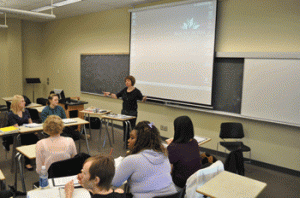A different kind of course
by Gabrielle Domanski

Photo by Kelsey Hipkin. Susan Harris is working hard to reach out to students and see women’s studies expand into a major in the coming years.
Since its induction into academics, women’s studies has been a course that has had its fair share of criticisms. However, at Mount Royal, it is one of the first courses within the humanities department to completely fill-up, with many students taking positions on waitlists in hopes of attaining entry.
According to Jennifer Pettit, chair of the department of humanities, the popularity of women’s studies courses has taken off in the past five years. So what exactly is the appeal of a course that has long been the underdog in the academy?
“Don’t you think that if you took a course that spoke to your reality for the first time in your life, everything you were reading about was relevant, that you would want to go back for more?” asked Susan Harris, coordinator and assistant professor of women’s studies.
Despite the various stigmas attached to women’s studies, there is undoubtedly a unique way of teaching found within feminist classrooms that is attracting more than just female students.
“There is a body of scholarship and practice known as feminist pedagogy which is trying to bring feminist knowledge and understanding to influence how we teach, not just what we teach,” Harris added.
According to Harris, this specific pedagogy focuses on redefining what knowledge is, and challenges the traditional model of authority where the professor is the expert disseminating knowledge to students. Within a feminist classroom, more voice is given to the students and the exchange of knowledge occurs through conversation, emphasizing the importance of their individual experiences.
“Experience is a valid and legitimate source of knowledge that can’t be trashed the way it has [been] in other male-stream disciplines,” Harris said. “Creation of knowledge is also meant to serve a social justice end. The knowledge produced in women’s studies or in a feminist classroom is supposed to be aiming towards a transformation of the self, of your small world and of the greater world at large.”
Kimberly Williams, also an assistant professor of women’s studies, explained that the discipline emerged during the ‘70s out of the need for female scholars, in specialties ranging from psychology to political science, to create a space to do their work free from marginalization.
Harris noted that the discipline started “with women as an identified category, where patriarchy was the system of domination and the centre of analysis and critique.” However, as the years have progressed women’s studies has expanded its subject matter to include other socially marginalized groups, and has become increasingly self-reflexive, which is a unique strength of the course.
“We are constantly asking, ‘Who are these women we’re studying?’ The feminist critique inherently lends itself to analyzing other disciplines,” Williams said. “Feminists talk about everything.”
Although women’s studies is gaining in popularity among students, it has not yet seen an end to the backlash, even from other members of the academic sphere.
“Typically backlashes happen when the dominant group feels threatened by the challenge to their power,” Harris stated. “The things that we privilege are often used against us as to why we don’t belong in an academic space; the fact that we want our knowledge to affect change in the real world.”
With the demand for women’s studies growing at Mount Royal, Harris mentioned that the future of the discipline at the university will hopefully see it as a major, as opposed to its current state of only being available as a minor. She added that new courses are being developed all the time in order to reach more students.
“Administration has made it very clear that they want to be the premier undergraduate university in Canada, and you can’t do that if you don’t have a women’s studies major,” Williams added. “We’re going to keep reminding them of that.”






